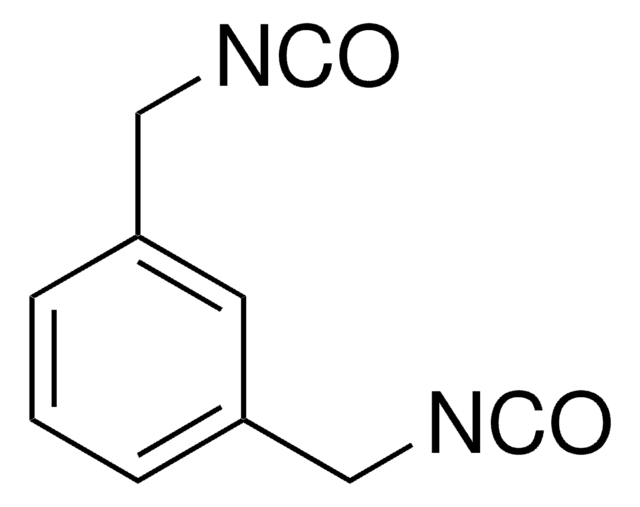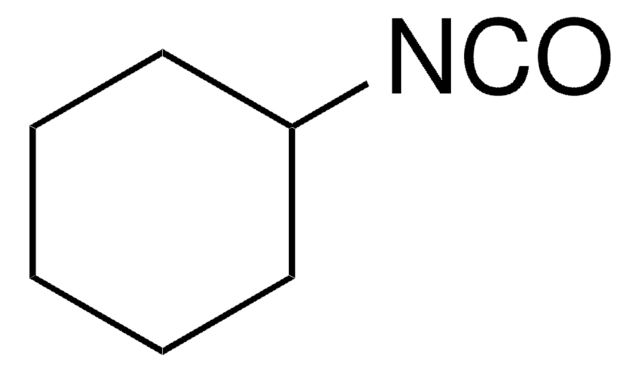405949
1,3-Bis(isocyanatomethyl)cyclohexane
mixture of cis and trans, 99%
동의어(들):
1,3-Bis(methylisocyanate)cyclohexane, Hydrogenated m -xylylene diisocyanate
로그인조직 및 계약 가격 보기
모든 사진(2)
About This Item
Linear Formula:
C6H10(CH2NCO)2
CAS Number:
Molecular Weight:
194.23
MDL number:
UNSPSC 코드:
12162002
PubChem Substance ID:
NACRES:
NA.23
추천 제품
vapor pressure
0.4 mmHg ( 98 °C)
Quality Level
분석
99%
양식
liquid
refractive index
n20/D 1.485 (lit.)
density
1.101 g/mL at 25 °C (lit.)
SMILES string
O=C=NCC1CCCC(CN=C=O)C1
InChI
1S/C10H14N2O2/c13-7-11-5-9-2-1-3-10(4-9)6-12-8-14/h9-10H,1-6H2
InChI key
XSCLFFBWRKTMTE-UHFFFAOYSA-N
일반 설명
1,3-Bis(isocyanatomethyl)cyclohexane is a highly reactive compound with two cyanate groups which allows the formation of tailored polymers with enhanced elasticity, thermal stability, and chemical resistance. It can form biodegradable hydrogels that facilitates its use in controlled drug delivery. It is also widely used as a cross linking agent to enhance the durability and stability of adhesives and coatings.
애플리케이션
1,3-Bis(isocyanatomethyl)cyclohexane can be used:
- As a precursor to synthesize pressure sensitive adhesives with strong adhesive strength and rapid strain recovery. These adhesives with high optical transmittance can be used in foldable displays, medical devices, and wearable electronics.
- As a cross linking agent to prepare gel polymer electrolyte for Li-ion batteries using UV curing.
- To fabricate niche-mimicking polymer hydrogels to identify molecular targets for treatment of pancreatic cancer.
신호어
Danger
유해 및 위험 성명서
Hazard Classifications
Acute Tox. 2 Inhalation - Acute Tox. 4 Oral - Aquatic Chronic 4 - Eye Dam. 1 - Resp. Sens. 1 - Skin Corr. 1C - Skin Sens. 1A
Storage Class Code
6.1A - Combustible acute toxic Cat. 1 and 2 / very toxic hazardous materials
WGK
WGK 3
Flash Point (°F)
235.4 °F - closed cup
Flash Point (°C)
113 °C - closed cup
개인 보호 장비
Eyeshields, Faceshields, Gloves, type ABEK (EN14387) respirator filter
이미 열람한 고객
C Simpson et al.
American journal of industrial medicine, 30(1), 48-55 (1996-07-01)
Twenty-three of 34 workers who had worked in the injection molding operation making polyurethane foam parts at an automobile parts manufacturing plant developed respiratory symptoms and/or systemic symptoms over a 2-month period following the full production use of a new
Meishan Chen et al.
Molecules (Basel, Switzerland), 24(8) (2019-04-21)
In recent years, polyureas with dynamic hindered urea bonds (HUBs), a class of promising biomedical polymers, have attracted wide attention as a result of their controlled hydrolytic properties. The effect of the chemical structures on the properties of polyureas and
자사의 과학자팀은 생명 과학, 재료 과학, 화학 합성, 크로마토그래피, 분석 및 기타 많은 영역을 포함한 모든 과학 분야에 경험이 있습니다..
고객지원팀으로 연락바랍니다.















